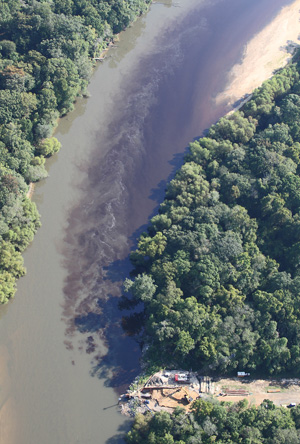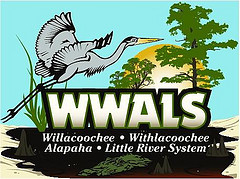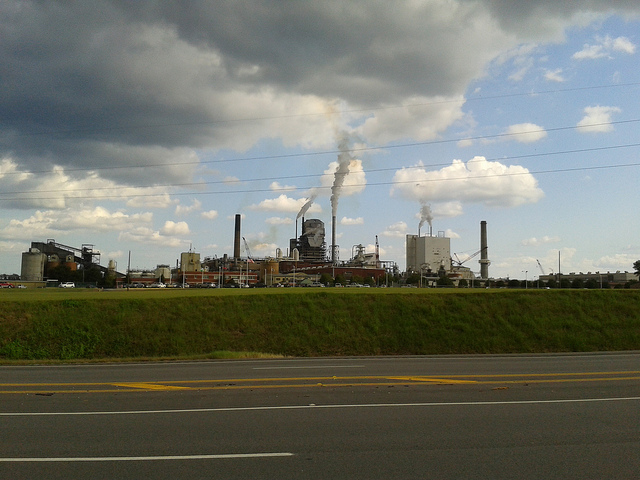It smelled as bad as it looked:
Picture by John S. Quarterman for Okra Paradise Farms, Lowndes County, Georgia, 7 September 2012.
 This is the notorious Rayonier paper mill near Jesup, Georgia,
that Georgia Water Coalition ranked on its Dirty Dozen,
2011’s worst offenses against Georgia’s Water,
as
#2, Altamaha River: Rayonier Pulp Mill Discharge Destroys Fisheries.
That report got
a reaction from Rayonier,
according to Mike Morrison in Jacksonville.com 8 November 2011,
Rayonier acknowledges waste issues,
This is the notorious Rayonier paper mill near Jesup, Georgia,
that Georgia Water Coalition ranked on its Dirty Dozen,
2011’s worst offenses against Georgia’s Water,
as
#2, Altamaha River: Rayonier Pulp Mill Discharge Destroys Fisheries.
That report got
a reaction from Rayonier,
according to Mike Morrison in Jacksonville.com 8 November 2011,
Rayonier acknowledges waste issues,
The head of Rayonier acknowledged Monday that there are problems with the water it discharges into the Altamaha River at its paper mill near Jesup but said the company is ahead of schedule on cleaning it up.
The Georgia Water Coalition on Saturday ranked a stretch of river in the vicinity of the mill second on its “Dirty Dozen,” a list of the state’s most polluted or otherwise damaged rivers, streams, wetlands and marshes.
“We are very committed to the water quality of the Altamaha River,” Rayonier Chairman and CEO Lee Thomas said. “It’s important to us, just as it is important to the people of southeast Georgia. We’re working hard to improve the discharge.”
 Rayonier’s pollution remains famous in song and story, such as in
this YouTube video.
Rayonier’s pollution remains famous in song and story, such as in
this YouTube video.
 More from
Deborah Sheppard of
Altamaha Riverkeeper
about Rayonier.
Among other things, she explains that the pollution includes
numerous chemicals, such as dioxins.
Rayonier has long been a major focus of Altamaha Riverkeeper,
which is one of the oldest riverkeepers in Georgia, and a role model for the whole state.
Yet things are a little different where we are.
More from
Deborah Sheppard of
Altamaha Riverkeeper
about Rayonier.
Among other things, she explains that the pollution includes
numerous chemicals, such as dioxins.
Rayonier has long been a major focus of Altamaha Riverkeeper,
which is one of the oldest riverkeepers in Georgia, and a role model for the whole state.
Yet things are a little different where we are.
We are fortunate in our watersheds in central south Georgia because
 we do not have any huge point sources of pollution like that
in any of the Withlacoochee, Willacoochee, Alapaha, or Little River
watersheds.
A new group,
WWALS Watershed Coalition,
has formed to advocate for our watersheds,
including educating about the non-point-source pollution we do have,
as well as they many recreational and economic possibilities of our watersheds.
we do not have any huge point sources of pollution like that
in any of the Withlacoochee, Willacoochee, Alapaha, or Little River
watersheds.
A new group,
WWALS Watershed Coalition,
has formed to advocate for our watersheds,
including educating about the non-point-source pollution we do have,
as well as they many recreational and economic possibilities of our watersheds.
-jsq
Short Link:
